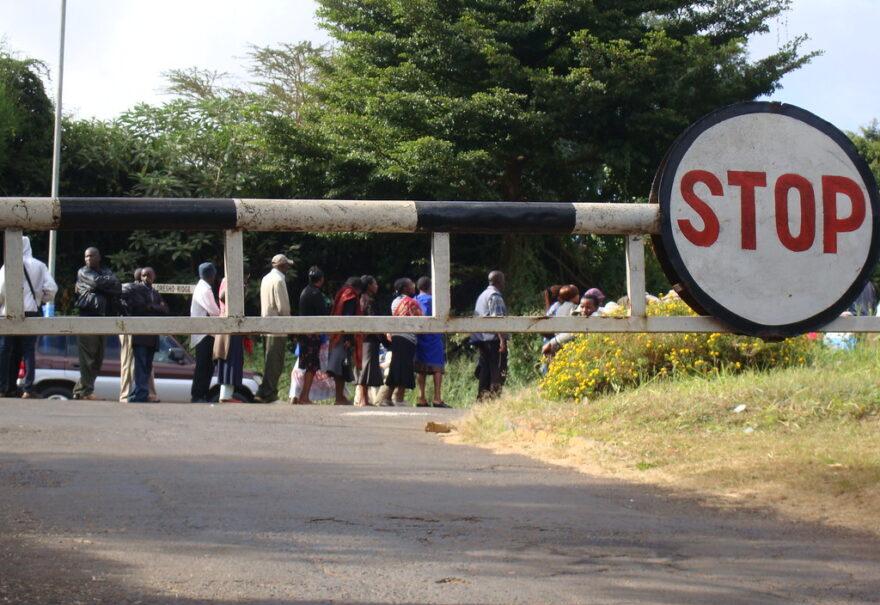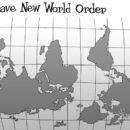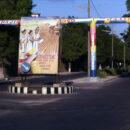Can’t buy me trust: Why are Africa’s elections so costly yet contested?

The continent spends more running elections than almost any other region. But trust in electoral processes cannot be bought. It has to be earned.

Voters queue to cast their ballots in an election in Kenya in 2013. Credit: ILRI/Susan MacMillan.
African elections are, on average, remarkably expensive to run. Between 2000 and 2018, it is estimated that sub-Saharan Africa spent approximately $44.3 billion on holding elections. Just seven recent polls – in Nigeria (2019), Kenya (2017 and 2022), the DR Congo (2019), Malawi (2019), Zambia (2021), and Angola (2022) – cost a combined $4 billion.
The logistics and administration of holding elections in which millions of people vote is, of course, expensive. But the costs in Africa outstrip those in other almost all other parts of the world. Countries on the continent spend on average $4.50 per capita on elections, compared to $4 in North America, Europe, and Australasia. The world average is $2.10 per person. India, which has a similar GDP per capita to many African countries, spends an average of just $1 per person.
Africa’s high spending on elections is alarming. Not only does the continent have countless competing spending priorities and huge gaps in funding for pressing needs, but the quality of elections is often poor. That a debt-distressed continent continues to spend enormous sums on elections – amidst signs of democratic decline – should be a source of concern for citizens as well as development partners called upon to support these processes.
Where the money goes
The cost of running elections in some African countries has been pushed up by issues such as the late disbursement of funds to electoral management bodies as well as opaque tender and procurement practices. However, often high costs have largely been engendered by low levels of trust in electoral process.
This has required electoral commissions to make otherwise simple administrative systems and procedures more complex to minimise the potential for irregularities. To manage mistrust in the process, some have turned to foreign companies to print ballots with expensive security features – comparable to those used on bank notes – and transported party and civil society representatives to observe their printing. In other cases, officials have procured costly electronic voting machines in a bid to minimise opportunities for fraud.
Unfortunately, these and other measures seem to do little to ensure peaceful and credible votes or ensure trust. Kenya’s recently-concluded 2022 elections, for instance, cost the state $370 million to run, yet were still contested at the Supreme Court by a losing candidate alleging “criminality”. The country’s previous elections in 2017 – the world’s second most expensive ever per capita at a whooping half a billion dollars – saw the presidential results nullified due to serious irregularities and had to be re-run to the tune of an additional $117 million.
Malawi’s 2019 elections were similarly annulled and re-held, costing the country upwards of $100 million overall. Meanwhile, the Democratic Republic of Congo’s long-awaited polls in 2018 were widely denounced as being fraudulent despite the nationwide deployment of expensive electronic voting machines and an election budget at one point estimated to be $1.8 billion.
How to rethink African elections
As these examples show, more spending and more sophisticated equipment does not necessarily mean better elections. And in fact, the opposite is often true.
Botswana, considered one of the strongest democracies on the continent, does not use expensive voting systems or even specially made transparent boxes to hold ballots, but cost-efficient local ones. The UK uses hardly any electoral paraphernalia considered essential in many African countries such as indelible ink and even eschews voter checks. And The Gambia was able to vote out a long-serving autocrat in 2016 using a decades-old practice of dropping marbles into containers representing different candidates. This voting system is simple and familiar, difficult to manipulate, and cheap.
What these comparisons show is that trust is paramount and that you cannot buy it. If voters and candidates do not believe in the institutions, processes and structures behind an election, showing them a new high-tech innovation or high-cost intervention that will supposedly make an election fraudproof will do little to help.
Electoral management bodies are, of course, somewhat constrained in building trust in repressive or undemocratic political contexts. But there is much that they can do, from the bottom-up, to build trust in electoral processes. Rather than putting their faith in expensive quick fixes, commissions can prioritise systems that are pragmatic, participatory, and centred on the interests of voters rather than on politicians. They can actively build trust among the electorate by ensuring citizen engagement at all levels of the process and by committing to the highest levels of transparency and effective communication. And they can turn to community-focused approaches that integrate accountability mechanisms that are meaningful and accessible to ordinary voters.
Electoral bodies can also save money in other ways. For instance, Ghana’s electoral commission saved over $90 million through an open and competitive tendering in 2020. But at the heart of Africa’s expensive – and often ineffective – elections is a deficiency in trust and confidence. This problem cannot be solved with money. It can only be addressed through a combination of political will and deliberate engagement, as well as reforms that are inclusive, transparent, and driven by citizens.
Correction [28/10/22]: The estimated cost of elections between 2000-2018 has been amended from $125 billion to $44.3 billion after the author of the research cited informed us of a calculation error in their original research.







Well articulated. Political influence on EMBs has adversely contributed to loss of confidence and trust. The late disbursement of funding can only be attributed to catching opponents I’ll prepared especially in countries were political parties are not funded by Government and creating fertile ground for violating tender procedures on the pretext of limited time, abetting corruption. The other factor is not undertaking cost benefit analyses before procuring costly gadgets that personnel fail to comprehensively utilize despite being trained. There have been instances where electronic systems have failed and EMBs have reverted to their usual manual systems despite spending whooping amounts. There is serious need for dialogue and consensus at all levels of the process by EMBs and Political players to build trust because members at grassroots are easily influenced and adhere to what their leader’s instructions. Also EMBs should be truly independent. Appointment of Commissioners should be by non partisan and inclusive select committees.
En effet les mots-clés de cet article relatif à la “chaine électorale” (acteurs politiques, scrutateurs électeurs, processus électoral) sont CRÉDIBILITÉ ET CONFIANCE.
Des termes de références qui imposent une véritable “campagne sociale ” disruptive en amont du processus électoral pour rassurer une société a priori traumatisée par des pratiques de mal gouvernance.
Le concept de justice transitionnelle est une étape dans ce processus de réconciliation du “polis” aux “politikus”; car il y va de l’attitude (rectitude, équité, transparence, productivité) des acteurs politiques, décideurs, autoritives administratives, dans leur leadership “daybyday” pour insuffler une sorte de “changement climatique politique”.
Il s’agira définitivement dune révolution sociologique qui a un coût. Mais à bien y voir, une fois l’investissement fait en amont sur l,Humain l’organisation des élections en elle-même quelque soit le processus électoral choisi, devrait être à la fois moins coûteux car bien plus fiable de mon humble point de vue.
Realities here
Thank you for this article
Indeed there is need to rethink our elections in Africa amidst the many challenges the continent is grappling with. The exaggerated amounts used for these elections can be channelled to basic needs that will make the lives better.
Democracy is fragile and should be fueled by strong institutions
I really hope that EMBs will find lasting solutions to issues raised.
Dear Koffi, Thanks for citing my work on ResearchGate/SSRN on Africa’s elections in the introduction to your article. It has been my intention to update the article, which I will do in coming months. There is, however, also a need for a correction. I do not think it takes away the general tenor of your or my views, but I have made a mistake that is beyond the inaccuracy margin! It is the amount of $125 billion mentioned which is derived from the multiple of 300 elections held in Africa over the 2000-2018 period, as compared to the 42 for which I found the total cost of $6.2 billion, rendering $44.3 billion, still an extraordinary total cost. The erroneous $125 bilion was derived by applying the multiple to $18.4 billion (rather than $6.2 billion) which was for the total for 102 elections worldwide in my sample. It is the remarkable if not excessive cost for elections held in Africa, and the continued widening of the cost differential with the rest of the world, that have cast a shadow over the ‘African Spring’ as reflected in the boom in elections held since the end of the Cold War. And I could not see any major reason for that other than ‘costs’ (especially for technology I believe) that have not led to increased ‘election value’ for the African people. Sincere apologies for the headline mistake!
Thanks for the correction, Jaap. We have updated it in the piece and issued a correction note below.